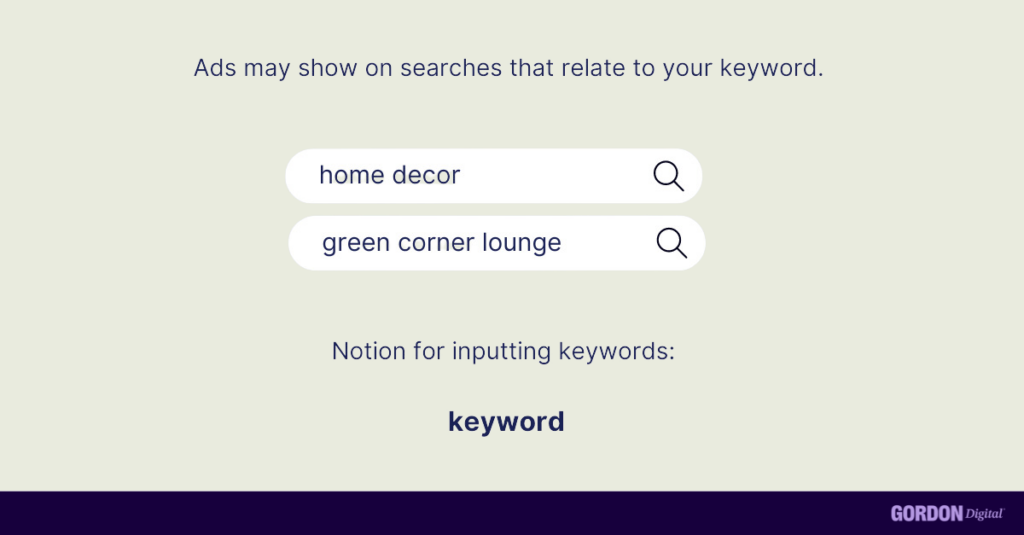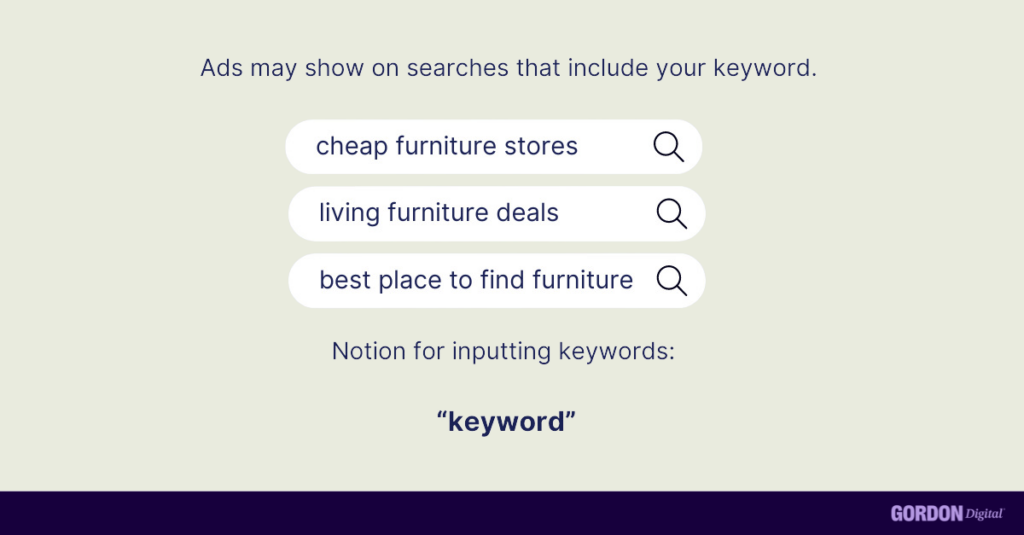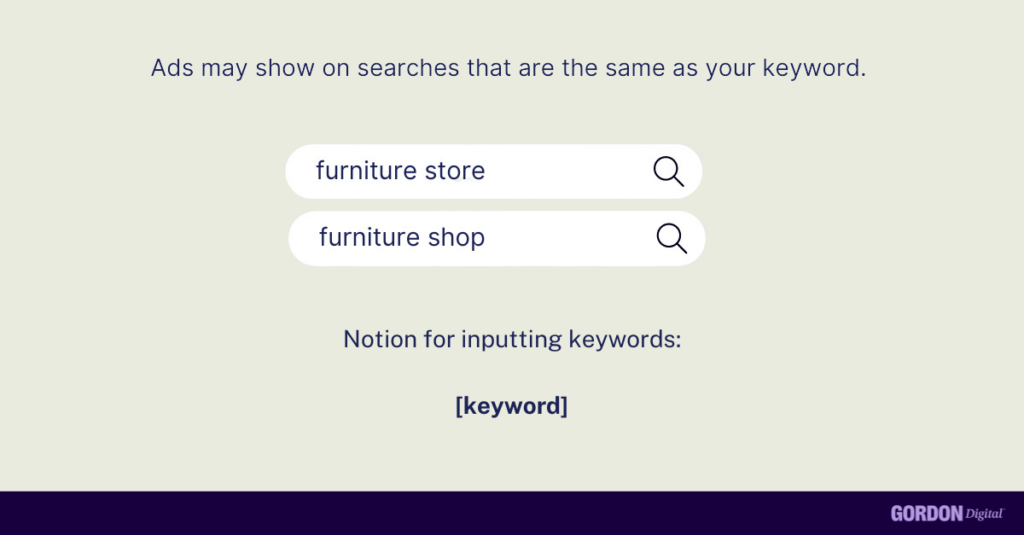Google Ads Keyword Match Types: What Are They?
Article Takeaways
- Keyword match types determine the alignment between a user’s search query and their chosen keywords.
- Different match types influence when and how ads are presented, impacting the effectiveness of ad campaigns.
- There are three types of keyword matches – Broad, Phrase and Exact Match.
- Before selecting a keyword match type(s), consider your budget, time management, visibility and goals.
- Run A/B tests with different match types to understand what works best for specific campaigns.
In This Article
What are the 4 main keyword match types?
In Google Ads, keyword match types affect which search queries your ads show for. The match types you choose have an impact on the reach and relevance of your ads. This ultimately affects whether the campaign is successful and cost-effective.
Google offers four main match types:
1. Broad match keywords
Broad match is the default match type on Google Ads.
Broad match keywords reach the widest audience. They allow your ads to appear for any word in your chosen key phrase (in any order), as well as for searches that are related to your chosen keywords and phrases. The syntax when creating ads is simply to type out your keyword as normal.
For example, let’s say we create an ad and bid on the broad match keyword wedding venue Brisbane.
Our ad could show for the following search queries:
- Affordable wedding venue (because the query has the same meaning as your keyword)
- Wedding ceremony Brisbane (because the query has the same meaning as your keyword)
- Brisbane wedding packages (because the ad points to a landing page that mentions you offer wedding packages)
- Brisbane wedding photographer (because your ad group contains ads which target the keyword “brisbane wedding”)
- How to elope in Brisbane (because it’s topically related to your keyword)

Advantages of Using Broad Match Keywords
- Largest audience reach – Using broad keywords that are displayed for related searches mean higher visibility and more clicks for your ads.
- Can help you discover new keyword opportunities – You conduct less keyword research, yet still have a huge variety thanks to Google’s AI. You can even be presented with new keywords/phrases that you weren’t aware of previously.
- Can have low Cost Per Click (CPC) – Broad match keywords may generate longer-tail search terms that are less common, so they cost less to bid on. You can learn more about how to maximise Google Ads Campaigns with the right bidding strategy.
Disadvantages of Using Broad Match Keywords
- Potentially irrelevant and low quality traffic – You’re likely to attract clicks from users who aren’t looking for exactly what you’re offering, leading to lower conversion rates.
- Wasted CPC – As we pay for each click with PPC ads, it can be a waste of budget to run a campaign that targets large volumes of keywords that are unlikely to lead to conversions.
- Damaged Quality Score – Ads with high visibility but a low click-through-rate may cause Google to think that your ads are poorly aligned with their keywords. This decreases your ad Quality Score, making it less likely that your ads will be displayed.
- Requires consistent upkeep – Your ads could start showing for hundreds of keyword variations each week. This match type requires constant monitoring to ensure keywords are still relevant.
- Extensive use of negative keywords – If your ads are starting to show for a significant number of irrelevant searches, you’ll need to create a list of negative keywords to narrow your targeting. Maintaining this list is an ongoing effort, and may be less effective than using an alternative match type.
2. Phrase match keywords
A phrase match allows your ads to show for queries that have the same meaning as your keyword, or more specific forms of your keyword.
Search terms can be added before or after your keyword, but not between. When creating ads, the syntax used to indicate phrase match keywords is to place quotation marks on either side of the target phrase.
Let’s revisit our example from before. Imagine we’re bidding on the phrase match keyword “wedding venue Brisbane”.
Our ad could show for the following queries:
- Small wedding venues brisbane (because the query contains your keyword’s meaning)
- Affordable wedding venues brisbane (because the query contains your keyword’s meaning)
- Barn wedding venues brisbane (because the query contains your keyword’s meaning)
- All inclusive wedding packages brisbane (because the query matches your keyword’s meaning)

Advantages of Using Phrase Match Keywords
- More control – Queries and search terms are likely to stay true to your chosen keywords list, unlike broad match which can trigger a variety of terms.
- Higher relevancy and less wasted budget – You’ll be targeting people who are searching for the exact keywords in your phrase match keyword list. This means you won’t waste money paying for clicks from people who aren’t interested in your ad.
- Better ad performance – Higher relevancy leads to stronger performance in your click-through-rate and conversion rate.
Disadvantages of Using Phrase Match Keywords
- Cost – Cost-per-click can be higher. This is because the keyword is more specific and may attract more competition.
- Limited reach – Phrase match keywords are more specific, so they can take more time to reach your target audience.
- Research requirements – This match type requires thorough keyword research to ensure highly relevant, voluminous and high demand keywords are being incorporated.
3. Exact match keywords
An exact match is the opposite of broad match – your ads only show for queries with the exact same meaning or intent as your keyword.
With this match type, you’ll get more refined visitors to your site, but you’ll have less reach. The syntax when creating ads is to place your keyword in square brackets, like so [keyword].
Let’s say you bid on [wedding venue Brisbane].
Your ad could show for the following queries:
- Wedding venues brisbane
- Brisbane wedding venues
- Wedding reception venues brisbane
- Wedding ceremony venues brisbane

Advantages of Using Exact Match Keywords
- Control – Exact match keywords give you the most control of any match types, as well as the most relevancy and most accurate targeting.
- Highly qualified traffic – Your ads will only show for a search query that matches your keywords closely, leading to customers that are more qualified.
Disadvantages of Using Exact Match Keywords
- Limited reach – Your audience reach and ad visibility will be limited to users using search queries that are very close to your keywords.
- Limited keyword opportunity discovery – Since you are limited to an exact variation of your keyword, you lose the opportunity to find new, high-performing keywords.
4. Negative match keywords
It’s tricky to know exactly which keywords to use or exclude when creating Google Ads.
The best thing you can do is begin. Do some keyword, competitor and audience research, and try to figure out which keywords your customers are using. Use those keywords and phrases to start your campaigns.
Once your ads are up and running, you’ll start seeing some of the search queries that are causing your ads to serve. It’s common to find high-performing search terms that you hadn’t previously considered.
It’s also common to discover search terms that are not related to your business. These search terms aren’t generating useful leads – they’re actually costing your business money.
We don’t want our ads to display for these search terms, and that’s where negative keywords come in.
Negative keywords are used to exclude certain keywords and phrases, so your ads don’t show for those queries. Negative keywords can help improve the targeting of your Google Ads.
For example, your company may install air conditioning, and you’re targeting keywords such as “Air Conditioning Installation”.
But you start to notice that you’re getting visibility for people searching for “Car Air Conditioning”, which you don’t service. Therefore, you would add “Car” or even “Car Air Con” as a negative keyword, to help refine keyword searches and your visibility.
How to choose the right match types for your keywords
Now you understand more about the different types of keyword matches, it’s time to consider the right match types for your business and keywords.
The right match types ensure your ads reach the intended audience. They strike a balance between strong visibility and precise targeting, with the ultimate goal of generating leads for the lowest possible cost.
When choosing match types, there are a couple of questions to ask yourself:
- Do you have the budget for your ads to trigger more frequently on broader terms, or do you need to streamline keywords to control your budget?
- Do you have the spare time it will take to sort through broad match terms and slowly refine your campaigns?
- Are you aiming for maximum visibility, or do you have specific targets in mind?
With this, you can start determining the direction of your keyword match types. Here’s a quick guide you can use to differentiate the different match types:
- Broad Match = Exploration / Quantity
If you’re unsure about the keywords you’ve chosen (e.g. if you have no historical data to rely on), begin with broad match. It provides a wide reach and helps identify relevant search terms.
- Phrase Match = Balance / Precision
Utilise phrase match for a more targeted approach. Your ads will show for queries that include the exact phrase or close variations, maintaining a balance between reach and specificity.
- Exact Match = Niche Targeting
Employ exact match for highly targeted campaigns. This ensures your ads are triggered only by the exact keyword or its close variants.
No matter what keyword match types you incorporate in your account, it’s important to continuously monitor the performance of your keywords.
Consistently monitor ad performance and review which search terms are generating clicks on your ads (this is especially important when using broad match keywords). Remember to use negative match types to ensure your budget is allocated to the most valuable clicks. Learn more about how to maximise ROI with the right Google Ads Budget.
Finally, don’t be afraid to run A/B tests with different match types. This can help you discover new keywords while also giving you a better understanding of what does and doesn’t work for your campaign!
Turn keyword match types into successful Google Ads campaigns!
Keyword match types are one of the fundamental features of Google Ads. While match types are useful tools, it can be a challenge to implement them effectively.
We recommend setting a budget and getting started with your Google Ads campaign. The sooner you start practising, the easier it will be to use match types to your advantage!
If you aren’t sure where to start, or if you’d like to plan effective Google Ads campaigns, the team at Gordon Digital would love to help.
Gordon Digital is a team of PPC and Google Ads specialists. We’ve worked on campaigns across Google, Facebook, Instagram, LinkedIn, Pinterest and more. As part of our Google Ads management, our team knows how to turn simple keywords into effective campaigns, so we can create a strategy that helps grow your business.
Get in touch to find out more, or book your strategy session to build a successful Google Ads campaign with Gordon Digital!